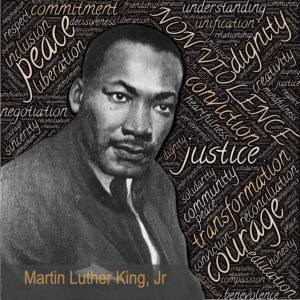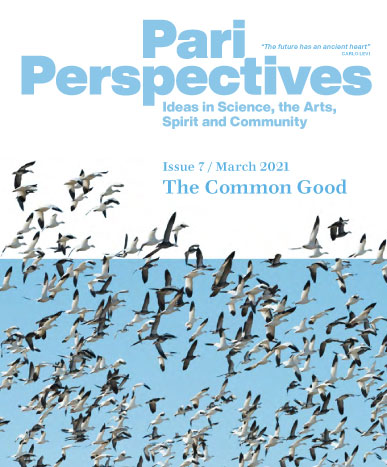Your cart is currently empty!

Unbounded Organizing: Collaboration and Fractals
the March 2021 issue of Pari Perspectives.
The arrival of the COVID-19 virus reveals in dramatic fashion the organizing patterns of human society and the worldviews informing them. When various levels of ‘lockdown’ see suspension of habitual modes of organization for periods of time, this brings greater awareness about these societal behaviours. In the decisions about which activities to resume, and in the welling up of spontaneous organization, we see the expression of priorities and aspirations. The workings of our activity systems are illuminated by our responses, given that all of society has been affected, and in different degrees ‘alarmed’ by the pandemic.
What is it that we can learn from this time of turning? Given that this first pandemic is merely a harbinger of the bigger crisis to come, since our way of life brings us hurtling towards climate destruction, what do we need to understand and act upon as a species? How may we become nimbler, what changes in activity are required if we are to have a chance to survive? What are the organizational lessons we may draw?

We can discern three major patterns of organization over the first year of the pandemic. The first comes from those formally tasked to lead society. Governments use the language of war against the virus to drive down a response through hierarchical organization, though when it comes to guidance and rules each government is constrained by the degree of confidence it enjoys with citizens, and by the ideology of its ruling party. Some cases show that those who have believed most in small government and free markets are the least prepared to set rules, while those less wedded to conventional economics do better in shaping responses. New Zealand, which in July 2019 replaced GDP with a Happiness Index as a measure of societal vitality, does well in restricting the virus’s impact, as does the state of Kerala in India, which is noted for the degree of collaboration between civil society and government. The UK and USA perform poorly, the latter’s stance was complicated further by the distaste of its president for science.
At the same time there is another organising impulse, which at times involves a shift in economic imagination but which generally sees a blossoming of horizontal and collaborative organization. In the first months of the pandemic, parts of the ideology that has been a reflex for perhaps 40 years are thrown overboard. Whereas only weeks before the start of the pandemic, hungry people are dismissed as ‘lazy’ and unwilling to work and thus not deserving of society’s attention, now there is broad acceptance of the necessity to feed those who are starving. That august magazine The Economist advocates changes to the rules of capitalism. Some governments adopt basic income guarantees, others implement different forms of social provisioning, from food parcels to grants. In many countries there is increased collaboration between private and public health systems. In the first months, corporations and wealthy individuals donate money towards the battle. This collaboration across sectors is most striking in the civil domain where there is organization to support the vulnerable. Emergent in every locality in the Global South are practices of solidarity across societal chasms. Established non-profits and emergent mutual-aid groups work together to distribute food. Ordinary citizens in countries like South Africa give of their time and money to help their neighbours. There is discussion and organization to strengthen local food systems, and a flowering of interest in regenerative methods of agriculture and circular economies. This inter-household, cross-organisation and cross-sectoral collaboration brings cooperation for the common good, organisation for life—organisation in harmony with nature, organisation that forms bonds of care and reciprocity—rather than simply organisation againstinequity, injustice and power elites.

As it turns out, the ‘suspension of market rules,’ unprecedented intersectoral collaboration and multi-stakeholder initiatives for the common good lasts only some six months. A year into the pandemic, the dominant discourse from governments and corporations is the need to find a balance between bringing the economy ‘back into working order’ and saving lives. The talk about changing capitalism stops, except of course in those circles which have always recognised its inadequacy. The exploitation of Gaia and pollution of her atmosphere, which was stopped for a few months at the start of the pandemic (so that we all marvelled at clear skies and dolphins in the Bosphorus close to Istanbul), continues apace. Bounded organization and bounded thinking firmly re-assert themselves…
A final pattern speaks to the human need for connection, through hundreds of thousands of online chats every day; Zoom is surely the adjective, verb and noun emerging from 2020. Electronic connectivity and enforced isolation bring millions of individuals into interaction across boundaries of geography and time. This creates conditions for shared narratives, and the organization that comes from shared stories, but as we have seen in the polarization of North American society, this does not always mean that this is organization for the common good. Binary thinking, and bounded practice, are unchallenged by greater communication, especially when narratives can be constructed that only loosely connect to facts.
What do I mean by ‘bounded organisation’? What makes me suggest that we need to learn unbounded organizing?
The idea of Unbounded Organization has been on my mind for some thirty years. At that time, as a community development organizer who had become immersed in the discipline of organizational development, I was playing pool in my home village with a friend. As we took turns at the table, he lazily remarked that he would like to be involved in development like me. ‘You guys who are in organizations have an interesting life; you’re always doing something!’ he said admiringly.

I suddenly saw my field in a different way. This was the highpoint of the age of NGOs. In Botswana we had organizations focused on small enterprise development, AIDS, forestry, women, water, permaculture, rural innovation and many more. There was an organization for every developmental issue. Each organisation, notionally serving similar development constituencies, had its own mode of operations, its goals and strategies, its rich internal life. If there was a difficulty, we would heal the individual organization, or see how to make it more effective. This multitude of organisations only tangentially affected most people living in the country. We were developing organisations rather than providing a means for popular development. While we were becoming adept at creating and maintaining these organizations, these could continue while only minimally affecting the broader society.
I began to see that this was not simply a feature of development organizations, but that these patterns were derived from the current organizational theories. These theories constrained us in an imagination and daily reality of individual organisations. I began to refer to ‘bounded organizations,’ where all those within an organization work for a specific goal and follow its rules and values. We talk about the organization’s members or staff, and about everyone else being ‘outside’ the organization. We assess an organisation’s ‘core competence,’ competitive advantage, and its ‘unique selling proposition.’ The organisation is the centre of the universe in its planning, rather than one member of a family of organizations. It focuses on its core purpose and may not notice anything else, and certainly has no obligation to address anything else.
Already in the 1950s Peter Drucker remarked that ‘society is a society of organizations,’ and this is indubitably true. We imagine that if all the myriad organisations do well then society will do well, our species will thrive, and moreover that we will have the prospect of achieving universal human rights. It is not so. The most urgent issues facing humankind cannot be successfully resolved or even tolerably well coped with by any single organization. More worryingly, crucial societal issues can easily be neglected in favour of each organization’s key purpose. Racism, sexism, and other ideologies of superiority, for example, may only be tangentially addressed by such organisations, each competing with the others for market share, finance, and time, each arguing that its issue deserves priority. Everything else—everything outside the issue that provides the rationale for the organization—can be left to ‘someone else’ to tackle… Often the ‘someone else’ turns out in our minds to be Government.
I have suggested elsewhere[1] that there is a ‘learned disability’ that is a consequence of this bounded organizations model, which was universally adopted in the latter part of the 20th century, in pace with the flourishing of American commerce and military after the Second World War. But this bounded organizations model has been four hundred years in the making, and I argued that as a result we human beings have lost a competence in societal organization that we must have had, to have created the many cultures we have created; and, indeed, to have survived as a species. As is shown most vividly by the start of the pandemic, we desperately need to recover this competence in societal organisation now. Bounded organizations theories—my name for most of the theories now prevailing—negate aeons of evolution; the result is that homo sapiens can’t manage its affairs in harmony with nature. It can’t create a humane society. It cannot sustain the conditions for life.

This organising model which ignores those outside the boundaries of an organization is a far cry from the ‘I am because we are’ of African wisdom, which also acknowledges that people are integrally part of the natural world. It is far from the ‘unity of hearts’ of Gandhi. Our epoch, starting with this first pandemic, is the epoch called upon to make human rights real instead of humiliating fictions for the world’s majorities. The spiritual alignment of kinship and ethnic groups that in an earlier time made human life secure and meaningful inside limited communities, must now be extended to every member of the human species. We must become, as Martin Luther King Jr said, a World Family in a World House[2]. Instead the opposite is happening. Instead of deepening and extending community, we are losing the capacity to create community altogether, and we habitually ignore our ecosystem.
Related to the limits of bounded organizations, is the ineffectiveness of appeals to government. On the matter of climate collapse, as one example—but crime, and the daily violence against women and children are others—our blind habit and immediate resort is to look to the government to solve these issues. This is so even when there is a dogma that favours small government, and even though governments themselves are bounded organizations with ministries and departments, and directorates and sub-directorates, as well as international, national, regional, and local scales of operation. Despite working as bounded organizations, governments are assumed to be able to tackle all issues and responsible to fix all problems. We act as if protesting to government can take the place of coherent and constructive analysis of the causal powers of social structures, in other words as if this can take the place of unbounded thinking; and as if stubborn opposition could take the place of the innovative practice of what Paulo Freire called cultural action for freedom[3]. The drama of the everyday is of course around how governments fail to lead us, notably on the issue of climate change.
There is another sense in which organisation has been bounded. A corollary of the increasing dominance of Europe and her offshoots over a period of 500 years, is the ‘squeezing out’ and obliteration of systems of knowledge that derive from other human civilizations, cosmologies, and cultures. The wisdom from ancient traditions is obscured and rendered invisible while one dominant knowledge system, with its constitutive rules for society, its scientific method and its cultural norms has flourished. Within this knowledge system, the different disciplines and domains of thinking struggle to speak to each other, locked as they have been within their respective silos. The ways of thinking about any issue are inevitably also bounded, and rather than an ecology of mind marked by analytico-synthetical thinking there is analysis of an issue to focus on its constitutive parts.


The call for Cognitive Justice is in one sense a move to escape from the limitations and disabilities consequent on this cognitive monoculture. Cognitive Justice represents the flourishing of a multiplicity of knowledge systems, the celebration of knowledges that have hitherto been demonized, marginalized, and rendered invisible; it means the decolonization of the curricula and pedagogy that were etched deeply and validated continually by generations of hegemony of what has been called Western Thought, or scientific thinking-practice[4].
Our imaginations are captured, and our daily activities locked into what I have come to call bounded theories of organization. Theories of separation.
This bounded organizations theory-and-practice has had a stranglehold on society for approximately four centuries. It is just over four centuries since the creation of the Dutch East India company, and the consequent development of the corporation as a prime organizational vehicle; a vehicle that privileges internal corporate governance dictates at the expense of societal scrutiny. Four centuries is approximately the time elapsed since Europe became organized around the principle André Orléan calls séparation marchande[5]or ‘market separation’ and others with disastrous naiveté call ‘freedom,’ often imagining with equally disastrous naiveté that the only possible alternatives to ‘freedom’ are ‘totalitarian.’ Corporations, the military, and government departments all thrive as bounded organizations, deliberately excusing themselves from responsibility for the common good.
Over less than half a millennium, age-old patterns of societal organization have been smashed. Age-old capacities for sharing dreams and visions, have been discarded or continuously disrupted. They survive in fragments, almost forgotten, or are museumized as cultural artefacts. Still, Governments and even more so the corporations who dominate the world continue to rely on the theory-and-activity of bounded organizations. It must be clear to anyone with eyes to see that all these organizations fail to achieve the organizing imperative for our survival. Though we have grown to be many on the earth, we are not competent in organising at this scale of population. We are not responding to Evelin Lindner’s challenge[6] to ‘make inside values outside.’ We work hard in organizations yet are inept in societal organization. I am venturing to suggest that more careful thought will confirm my suggestion that this mental malware, this defective programming of human thinking, provides a deep explanation of why, contrary to our own interests, we are ravaging and poisoning our planet, and failing to provide for all people.
Unbounded Organization
Just before the turn of the millennium in 2000 new patterns of organization were initiated, responding to the urgent environmental and social issues hitherto ignored by corporations, through intersectoral collaboration, and cross-boundary cooperation, and multi-stakeholder initiatives. There are now many positive examples to learn from. Unbounded Organization has begun to traverse the spaces between organizations, seek alliances amongst organisations, interpersonal linkages across individual organizations’ vertical and horizontal boundaries; the conscious weaving of activity towards shared purpose, notwithstanding notional boundaries of individual organisations and the hierarchies within them. Unbounded organization is seeking alignment for the common good, interconnections across an activity system, alignment of an organizational ecosystem. In the last quarter of a century many people in many places have started to recognize that what I am calling unbounded organization is the area where hope resides. It is the practice that can unravel the bounded patterns of dysfunctional organizing that take us hurtling on a collision course with physical realities.
Unbounded organization represents the creation of, and organising for, a practice that is sensitive and committed to the defence and elaboration of civic values and culture, renewal of relationship with Mother Earth, Gaia, and regeneration of respectful stewardship of nature. Unbounded organization draws on ancient wisdom and the practices from a time when humans understood ourselves to be not separate from nature, but a part of nature. Unbounded organizing is not only nature friendly but nature-resonant.
This is of course not to claim that Unbounded Organisation is the answer to all problems of modernity, but some of us believe that it is an approach that will bear fruit with diligent work. Some of us are treating it as a key idea to open locked doors at such levels as academic research, popular development organization, educational reform, interpretation of current events, constructive politics, moving beyond economic theory to organization theory, peace education, community development, ethics, large group and community psychology, local economic development, green technologies, and paradigm-shifting action projects on the ground.ù
It is the embrace of unbounded organizing that heralded hopes for change at the start of the pandemic. Governments have used the metaphor of war against the virus to appeal for societal cohesion, yet some ensured compliance with measures to combat its spread through the presence of armed men. This tension between bounded and unbounded organization exists at all levels of society. We can see that the first moves to change ‘the rules of the game’ are already challenged by those who believe that the economic orthodoxy of the last 50 years is the only way to run the world. Indeed, all those of us who experience financial difficulty during the pandemic wish that we could go back to the best of a ‘working economy,’ and struggle to find a new economic imagination.

We have then a question about Unbounded Organizing. How do we learn to increase possibilities for planetary health and human flourishing? How do we create conditions for Freire’s ‘cultural action for freedom[7]’?
Activity Systems Renewal: The Organization Workshop Methodology
My own life work has been in popular development organization, developing and advancing a methodology initiated by Clodomir S. de Morais in Brazil some 50 years ago. This is variously known as the Organization Workshop OW, the Large Group Method, or the Laboratory in the Theory of Organization. The engine for the OW[8] is an enterprise formed by several hundred participants, who are provided with the tools, equipment, infrastructure, and other means to earn a living, so that the only constraint is their own ability to organize. Through a period of a month to six weeks this complex enterprise is able to access learning sessions on the theory of organization, and to arrange any other course it may require. Invariably the participants achieve results that cannot be fully predicted by those who designed the process. Invariably new leadership emerges. Invariably, and crucially, all actors in an activity system get affected and drawn into an emerging institutional framework. Invariably, small enterprises are nurtured through the alignment across the local ecosystem. The OW creates an unbounded enterprise for common purpose where all actors in an organizational ecosystem can collaborate, and it creates institutional arrangements that foster new repertoires of organization.
Methods like this are of course not possible to implement in a time of pandemic. The OW throws a new activity system into being and enables a nurturant future to come dancing to life. Are there ways to achieve this without working in large groups? Across the world people have found answers to that question since resilience is still a quality of human beings. Some of us have started to explore the concept and practice of activity fractals: a set of actions in favour of life’s flourishing, that perturb the broader ecosystem and because this fractal is undertaken at regular intervals, starts to affect this system. At this time of turning, we need to learn from all experiments like this, urgently look at emergent organization in the civil domain, draw lessons for the future. We are challenged to learn our way into a future of unbounded organization.
Notes
1 Andersson, Gavin. (2018) Unbounded Governance: A Study of Popular Development Organization. Scholars Press: Beau Bassin.
2 King, Jr., Martin Luther. (1967) Where Do We Go From Here? Chaos or Community. Boston: Beacon Press.
3 Freire, Paulo. (1998) ‘Cultural Action for Freedom.’ Harvard Educational Review, vol. 68, pp. 476-522; Richards, Howard. (1985) The Evaluation of Cultural Action. London: Macmillan.
4 Shiv Visvanathan, Shiv. (1987) A Carnival for Science: Essays on Science, Technology and Development. Oxford: Oxford University Press.
5 Orléan, André. (2011) L’Empire de la valeur: Refonder l’économie. Paris : Seuil.
6 Lindner, Evelin. (2006) Making Enemies: Humiliation and International Conflict. Westport CT: Praeger. Evelin is a founding member of the Unbounded Organization Academy. See her website www.humiliationstudies.org.
7 Freire, Paulo. (1998) ‘Cultural Action for Freedom.’ Harvard Educational Review, vol. 68, pp. 476-522; Richards, Howard. (1985) The Evaluation of Cultural Action. London: Macmillan.
8 Those interested may read Gavin Andersson, Raff Carmen, Iván Labra & Howard Richards (2017):Organisation Workshop. Beyond the Workplace: Large Groups, Activity and the Shared Object,Mind, Culture, and Activity https://doi.org/10.1080/10749039.2017.1386218


